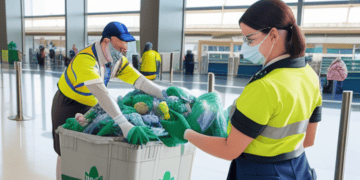Dubai Airports has successfully reduced its waste to landfills by 60%, marking a significant step towards its broader sustainability objectives, including a reduction in the carbon footprint of Dubai International Airport (DXB). This achievement contributes to setting new standards in the industry for environmental consciousness and encourages passengers and visitors to engage in more sustainable practices.
In collaboration with BEEAH Group, a leader in sustainable solutions including advanced waste management, Dubai Airports devised a comprehensive food waste treatment strategy. This plan aims to annually compost over 2,000 tonnes of food waste from the various food and beverage outlets, lounges, and hotels located within DXB’s terminals and concourses. The initiative, which has been operational for some time, involves the distribution of food waste bins, extensive staff training, and has already processed more than 400 tonnes of food waste annually.
Paul Griffiths, CEO of Dubai Airports, emphasized the importance of sustainable waste management in reducing environmental impact and the ecological footprint of airport operations. Griffiths highlighted the waste reduction milestone as evidence of the effective collaboration with DXB stakeholders and reiterated the commitment to continuous improvement in sustainability practices in line with the UAE’s goal of achieving Net Zero emissions by 2050.
The waste management efforts at Dubai Airports include separating recyclables at the source, on-site composting of organic waste, and a partnership with key stakeholders, such as DXB Hotel and food & beverage operators, to ensure the effective diversion of waste from landfills. An initiative to convert 100% of cooking oil used in the airport’s food and beverage outlets into biodiesel fuel is also part of these sustainability measures.
Rafael Lopez, CEO of BEEAH Tandeef, BEEAH’s waste collection and city cleaning division, commended Dubai Airports for achieving a 60% reduction in landfill waste at the world’s busiest international airport. He underscored the role of sustainable infrastructure and services in addressing waste and emissions challenges, highlighting the critical importance of collaboration in achieving positive climate outcomes.
Furthermore, Dubai Airports is aligning its concessionaires’ operations with environmental sustainability goals that include waste and water management and efficient electricity use. Collaborations with Emirates Airport Services Lounges and Emirates Flight Catering have led to significant waste reduction, responsible procurement practices, and the implementation of energy-saving measures.
Waste management at Dubai Airports encompasses handling various waste streams, including aircraft cabin waste and municipal solid waste from concourses and terminal buildings, which together account for about 92% of the total waste generated daily. The waste management plan has also resulted in a 38% reduction in operational costs monthly, attributed to the value recovered from recycled materials.
Discover comprehensive supply chain report news insights at The Supply Chain Report. For international trade resources, visit ADAMftd.com.
#SustainabilityNews #WasteManagement #DubaiAirportsNews #EnvironmentalImpactNews #CarbonFootprintReduction















